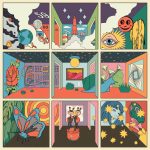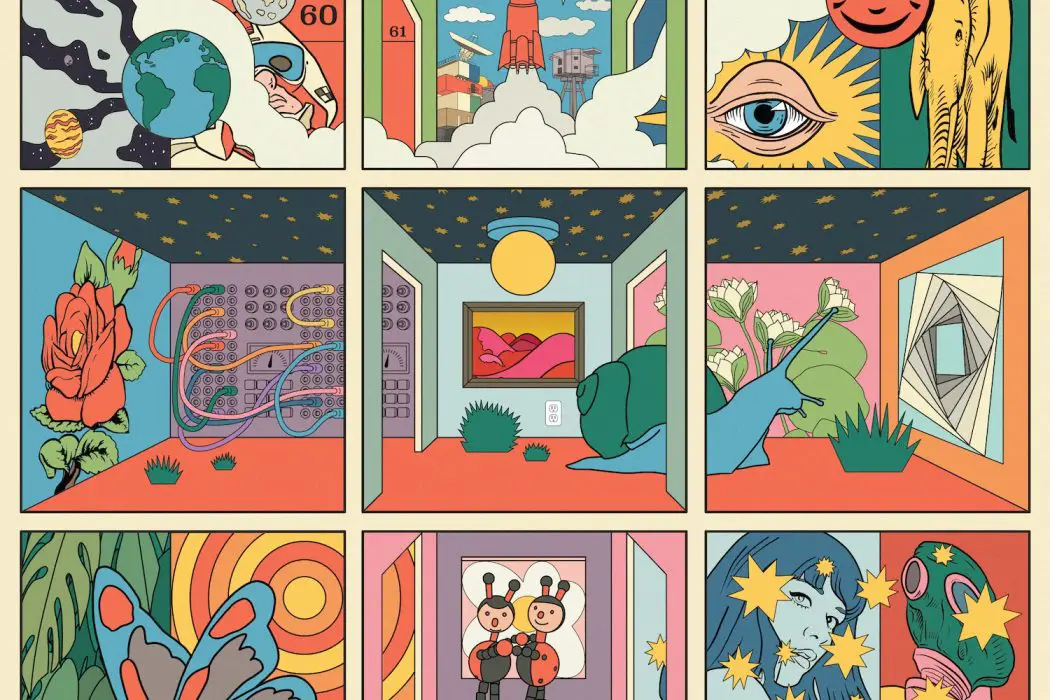‘Future Past Life’, the long-awaited fifth studio LP of indie rock group STRFKR, confirms the group’s versatility and lyrical maturity, while acoustic-driven instrumentation creates space for the album’s most rewarding sonic ventures.
OA live STRFKR show is one of reality-altering aestheticism – a succession of electro-indie dance party hits strung seamlessly together with spoken word interludes and overlaid by lasers and brilliant lightshows. The lo-fi vocals of frontman Josh Hodges create a transcendental intimacy unique to STRFKR and revered by fans since their formation in 2007.
Beginning as the solo project of Hodges with roots in Portland, even the name “STRFKR” was a rejection of industry commonalities and social politics. It introduces a level of intentional satire following Hodges’ previous involvement in a band subjugated to label dictation. Their debut self-titled LP arrived in 2008 featuring 2000’s indie anthem “Rawnald Gregory Erickson the Second”, but it wasn’t until 2016 that the group met widespread success with the release of Being No One, Going Nowhere and subsequent placement on the US Independent Albums chart. Today marks the conclusion of a four-year hiatus from original releases with the surprise drop of ten-track LP Future Past Life off of Polyvinyl Record Co.
Stream: ‘Future Past Life’ – STRFKR
Future Past Life as a whole is a celebration of minimalism in STRFKR’s own unique interpretation. If Being No One, Going Nowhere was the zenith of the group’s defining sound, this record is verification of the group’s versatility and lyrical maturity beyond that. Previously obscured under layers of thickly-coated reverb, the lyricism of Future Past Life raises the question of whether the group ever lacked that complexity or if this album is simply its first showcasing endeavor. The first lines of opening track “Dear Stranger” instantaneously confront the listener with themes of lyrical aptitude that carry throughout the record:
Sweet mother, kept me forever
Alone and safe in a room
Why would I ask for anything other
Your world is all that I ever knew
The release of “Never The Same,” single number one off of Future Past Life, came alongside a lyric video on February 28th – raising suspicions amongst fans of a fifth studio album. Despite this four-year disruption between records, the group had far from disappeared from the music scene – with a series of releases including remixes of Being No One, Going Nowhere, a live album, a feature on Whethan track “Stay Forever”, and a three-part sequence of unreleased tracks from the depths of Hodges’ old computer premising what would evolve to become STRFKR’s sound.
“Never The Same” redefined the notion of intimacy for the band with a sound diverging from the multi-layered synth and electronic drumbeats and replaced by minimalist acoustic guitar instrumentation highlighting once again the lengths the group can push lyricism.
The track “Deep Dream” came in conjunction with a whimsical music video depicting the escapades of a park ranger in a snowy wilderness. The visuals coupled with the ambient sonic textures takes on an almost trans-dimensional air, consistent with STRFKR’s aesthetic and apt to the title of “Deep Dream”. Known for their melodic sweeping vocals, labelmates Shy Boys were brought onto “Budapest” to complement Hodges’ stacked harmonies. The group’s blend of melancholy tones with bubblegum falsettos is the perfect parallel to STRFKR’s juxtaposed electro/lo-fi cornerstone, and this shines through seamlessly on the track.
I was really into harmonies, but wrote too many for the song. I actually had to go back and delete a lot of them once it ended up being like, you know… an entire choir of me singing “Ahhs” underneath stuff – that was probably unnecessary, but I really liked the kind of Gregorian-esque harmonies that I came up with.
The paramount victory of this record arrives with the instrumental breakdown of “Pink Noise,” with waves of opulent melodies perfectly enrapturing the marriage of STRFKR’s signature polished synth with undone acoustics. It offers a moment that is intimate and inviting yet recalls memories of packed concert halls and flashing lights.
Halfway through closing track “Cold Comfort,” the melody gives way to an underlying ambience as strange yet enthralling as the title itself. The final three minutes of Future Past Life carry an air of otherworldliness with almost inhuman sub-textures creating a sense of departure of the music from our realm, or rather a return to its own celestial origins.

With only ten tracks, the brevity of STRFKR’s latest adds to a sense of evanescence for the group and raises questions surrounding the future of the group’s aestheticism. Regardless of where these answers lie, the direction we’ve seen in this 2020 resurgence thus far has demonstrated an absolutely triumphant elaboration on the core sound fans have repeatedly been captivated by with each release.
— —
:: stream/purchase STRFKR here ::
— — — —

Connect to STRFKR on
Facebook, Twitter, Instagram
Discover new music on Atwood Magazine
? © Polyvinyl Record Co.
:: Stream STRFKR ::









